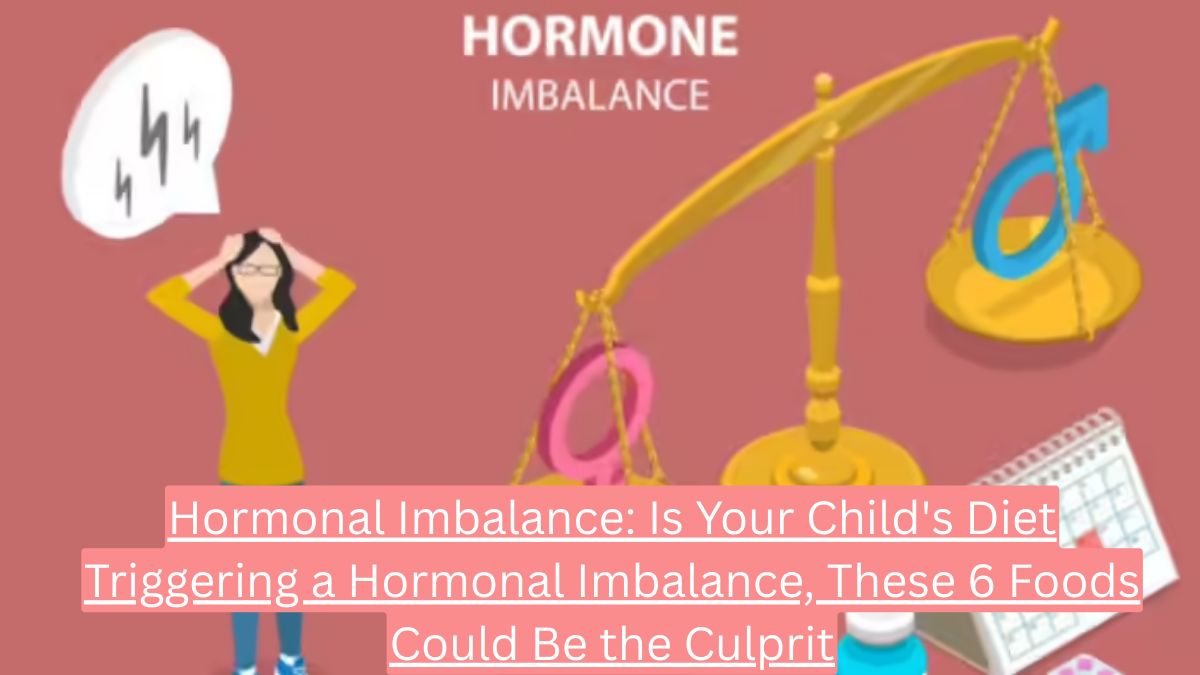Hormonal Imbalance: Is your child often irritable, low on energy, or struggling with focus? Do you notice sudden changes in their weight or mood that seem unexplainable? While we often dismiss these as typical childhood phases, they could be alarming signs of a silent crisis brewing within their bodies: hormonal imbalance.
Hormones are the body’s powerful chemical messengers that control everything from a child’s height and weight to their mental development, mood, and even their energy levels. Childhood is a period of rapid growth, and during this crucial phase, the delicate balance of these hormones is paramount. Unfortunately, our modern diet and lifestyle are quietly disrupting this balance, posing a significant threat to our children’s long-term health and well-being.
The food your child eats has a direct and profound impact on their hormones. Processed carbohydrates like refined flour (maida), bread, pasta, pizza, and white rice cause a rapid spike in blood sugar levels. This constant surge forces the body to release excess insulin, leading to a cascade of hormonal disruptions that can have serious consequences.
According to Rakshita Mehra, a nutrition consultant at Rosewalk by Rainbow Hospital, a child’s diet, snacking habits, and lifestyle are directly linked to their hormonal equilibrium and energy. To prevent hormonal imbalance, it’s crucial to provide children with the right nutrition from an early age. A diet rich in high-fiber and protein-packed foods, whole grains, fruits, and vegetables helps stabilize blood sugar and manage stress. These foods promote the release of serotonin, a neurotransmitter that induces a sense of calm and well-being in the brain.
Let’s delve deeper into the modern-day culprits that are wrecking your child’s hormonal health and the lifestyle changes you can adopt to protect them.
What Exactly Is Hormonal Imbalance?
Hormonal imbalance occurs when there is too much or too little of one or more hormones in the bloodstream. Even a slight fluctuation can cause major changes throughout the body, sometimes leading to conditions that require medical treatment. While some hormonal imbalances are temporary, others can be chronic and long-lasting, impacting a child’s development for years to come.
The 6 Culprits in Your Kitchen: Foods to Eliminate Immediately
To safeguard your child’s hormonal health, it’s essential to remove or drastically limit these six food categories from their diet:
- Refined Flour (Maida) Products: Foods made from maida, such as white bread, biscuits, and many packaged snacks, are stripped of fiber and nutrients. They cause an immediate spike in blood sugar, putting immense stress on the insulin-producing pancreas.
- Sugary Drinks and Processed Juices: Sodas, cold drinks, and packaged fruit juices are loaded with sugar and empty calories. They offer zero nutritional value and are a direct ticket to insulin resistance and hormonal chaos.
- Packaged Snacks (Chips, Chocolates, etc.): Most children gravitate towards these snacks. However, these high-sugar, low-nutrient options provide a short-lived energy burst followed by a crash, leading to fatigue, irritability, and difficulty concentrating.
- Pizza, Pasta, and White Rice: While popular with kids, these refined grains behave just like sugar in the body. They disrupt blood sugar levels and contribute to a cycle of cravings and energy slumps.
- Processed Meats: Sausages, hot dogs, and other processed meats often contain preservatives, additives, and unhealthy fats that can interfere with natural hormone production.
- Caffeinated Drinks: Caffeine can disrupt the delicate hormonal balance, particularly the stress hormone cortisol, leading to anxiety and sleep disturbances.
It’s Not Just Food: How Lifestyle Wreaks Havoc
Hormonal balance isn’t solely dependent on diet. A child’s daily routine plays an equally significant role.
- Lack of Sleep: Insufficient sleep is a major trigger for increased stress hormones (cortisol). This not only affects a child’s mood and ability to focus but also disrupts their overall hormonal environment.
- Excessive Screen Time: A sedentary lifestyle dominated by screens can lead to insulin resistance and imbalances in growth hormones. It replaces crucial physical activity needed for healthy development.
- Lack of Physical Activity: Daily exercise is a natural hormone balancer. It releases endorphins (the “happy hormones”), improves metabolism, and naturally boosts energy levels.
The Solution: Building a Hormone-Healthy Lifestyle
The key to preventing hormonal imbalance in children is not complicated. As experts suggest, focusing on a foundation of nutritious food and a balanced lifestyle can ensure their physical, mental, and emotional development remains strong.
Introduce these powerhouse foods into their diet:
- Green Leafy Vegetables: Spinach, kale, and other greens are rich in essential vitamins and minerals.
- Nuts and Seeds: Almonds, walnuts, chia seeds, and flax seeds provide healthy fats crucial for brain and hormone health.
- Eggs & Fatty Fish: Excellent sources of protein and Omega-3 fatty acids.
- Legumes: Lentils, chickpeas, and beans are packed with fiber and protein.
- Yogurt: A great source of probiotics that support gut health, which is closely linked to hormonal balance.
- Fresh Fruits: Offer natural sweetness along with vital nutrients and fiber.
By making these simple yet powerful changes, you can protect your child from the hidden dangers of hormonal imbalance and set them on a path to a vibrant, healthy, and energetic life.
Disclaimer: This article is for general informational purposes only and does not constitute medical advice. Always consult with a healthcare professional or your doctor for any health concerns.














